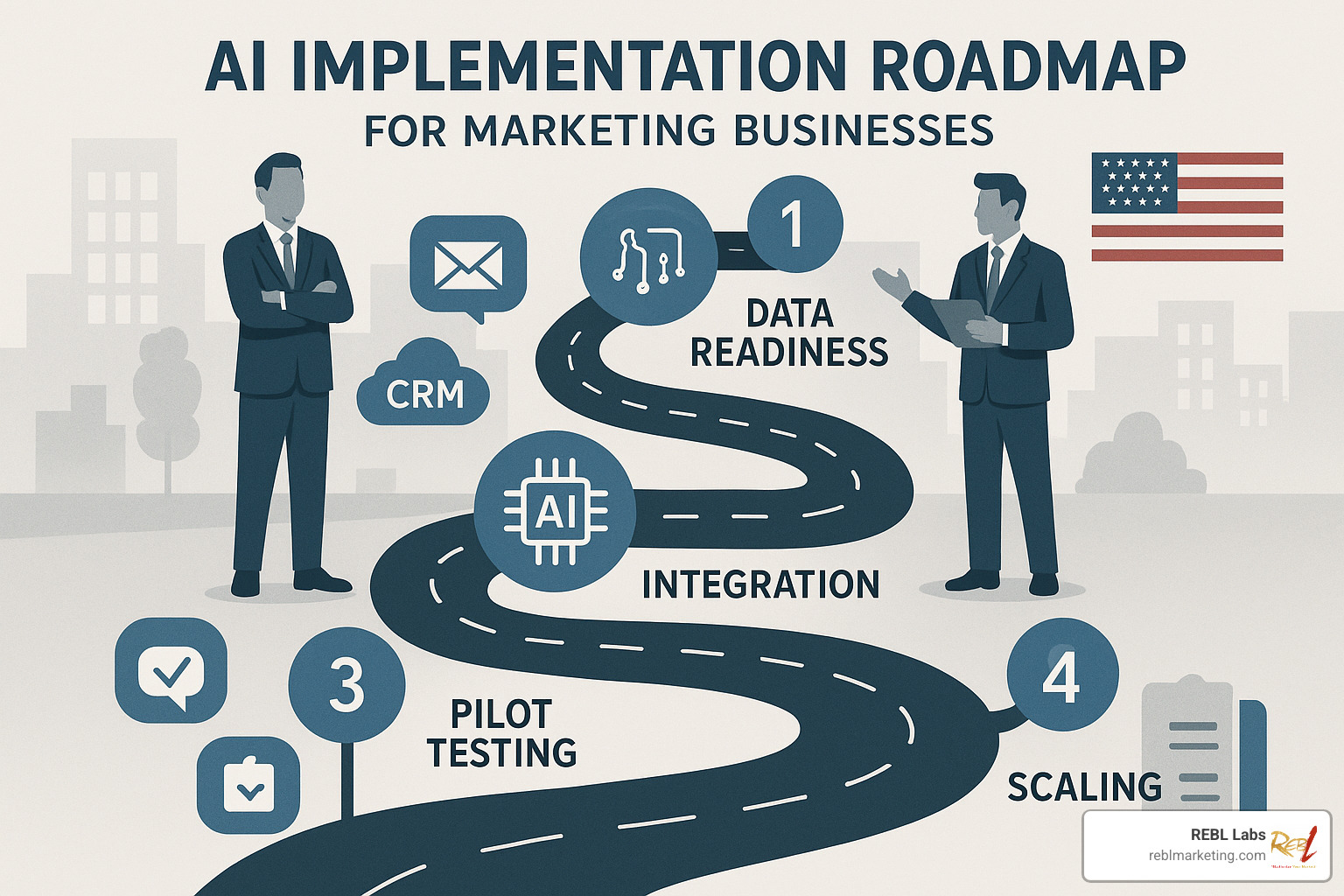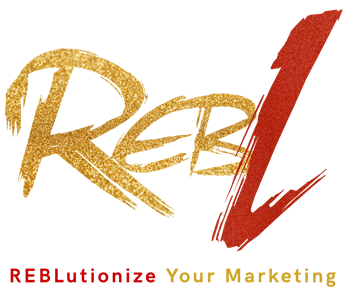The Revolution in Marketing Efficiency
AI automation for marketing business is changing how companies operate by combining artificial intelligence with marketing workflows to automate repetitive tasks, personalize customer experiences, and optimize campaigns in real-time.
What is AI Marketing Automation?
- Definition: Using AI systems to execute, manage, and optimize marketing tasks that would typically require human intervention
- Core technologies: Machine learning, natural language processing, predictive analytics
- Primary benefits: Time savings, personalization at scale, data-driven decisions
- Common applications: Content creation, customer segmentation, campaign optimization, chatbots
Marketing teams today face mounting pressure to deliver more personalized experiences across multiple channels while working with limited resources. Traditional marketing automation relies on preset rules and triggers, but AI-powered automation adapts and learns from data to make intelligent decisions.
According to Gartner, 30% of all outbound marketing content will be AI-generated by 2025, while 85% of marketers are already updating their skills to keep pace with AI advancements. The business impact is substantial – companies like Harley Davidson achieved a staggering 2,930% increase in leads per month after implementing AI marketing automation.
What makes AI automation particularly powerful is its ability to analyze vast amounts of customer data and act on insights in real-time, something impossible with manual processes or basic automation tools. This enables marketers to deliver hyper-relevant experiences that boost engagement and conversion rates.
I’m REBL Risty, founder of REBL Marketing and REBL Labs, with over two decades of experience helping businesses implement AI automation for marketing business solutions that transform overwhelming manual tasks into streamlined, scalable systems.

Why This Guide Matters
Whether you’re a marketing director weighing the benefits of AI adoption, a business owner looking to scale your marketing efforts, or a marketing professional wanting to stay ahead of industry trends, this guide provides the knowledge you need to make informed decisions.
The search for effective AI marketing automation solutions has surged as businesses recognize the competitive advantage of implementing these technologies. Our comprehensive guide addresses this search intent by providing clear, actionable insights for decision-makers at all levels.
How to Use This Guide
This guide is designed to walk you through the AI marketing automation landscape step-by-step:
- Start with the core concepts to build your foundation
- Explore the business benefits and ROI potential
- Find proven use cases and success stories
- Steer the 2024 toolscape to find your perfect solution
- Learn implementation best practices and future trends
Bookmark this resource to reference as you build your AI marketing strategy, and share it with colleagues who may benefit from understanding how AI automation for marketing business can transform your operations.
AI Automation for Marketing Business: Definition & Core Concepts
Let’s talk about what AI automation for marketing business really means. Think of it as your marketing team getting a super-smart assistant that never sleeps, learns from experience, and gets better over time.
Unlike the old-school automation tools that just follow preset rules (like a simple recipe), AI marketing systems can actually think, learn, and adapt – almost like having a digital marketing expert working around the clock.
These smart systems can spot patterns in how your customers behave, predict what they might do next, create fresh content that sounds human, tweak your campaigns on the fly, and deliver personalized experiences to each individual customer.
The magic happens through several powerful technologies working together:
Machine learning algorithms form the brain of the system, improving with every interaction without needing explicit programming. Natural language processing (NLP) gives your AI the ability to understand and create human-like language. Predictive analytics helps forecast future outcomes based on historical data. And data integration pulls everything together by connecting information from all your different marketing tools.
What Sets AI Apart From Traditional Automation
I love explaining this difference to clients because it’s truly game-changing. Traditional automation is like a simple light switch – if X happens, do Y.

AI automation for marketing business is more like having a smart home system that learns your preferences, adjusts the lighting based on time of day, and even suggests new settings you might enjoy.
| Feature | Traditional Automation | AI-Powered Automation |
|---|---|---|
| Decision-making | Based on predefined rules | Learns and adapts from data |
| Personalization | Limited to segments | Individual-level customization |
| Content creation | Templates with variables | Generates unique, relevant content |
| Optimization | Manual A/B testing | Continuous, automated optimization |
| Timing | Fixed schedules | Optimal timing per individual |
| Scalability | Limited by rule complexity | Improves with more data |
One of our clients, Roman Olney, put it perfectly: “By automating workflows that would typically take weeks and cost thousands of dollars through agencies, we’ve saved $16 million dollars this year alone.” That’s not just efficiency – it’s change.
Key Building Blocks
Building effective AI automation for marketing business requires a few essential components:
First, you need a solid Customer Data Platform (CDP) – think of this as the brain that collects and organizes all your customer information in one place. Without good data, even the smartest AI will struggle.
Next, you’ll need APIs and integrations that connect all your marketing tools, your CRM, website, and other systems. These connections ensure data flows smoothly between platforms.
Cloud infrastructure provides the computing power needed to process all that data and run complex AI models without slowing down your systems.
And finally, you need feedback loops – ways to capture how well your campaigns are performing and feed that information back into the AI so it can keep getting smarter.
Primary Drivers in 2024
Three major factors are pushing businesses toward AI automation for marketing business this year:
Generative AI has exploded onto the scene, with tools like ChatGPT making it possible to create high-quality, on-brand content at a scale we’ve never seen before. What used to take days now takes minutes.
Privacy regulations continue to tighten, with third-party cookies disappearing and stricter laws protecting consumer data. AI helps marketers make smarter use of the first-party data they already have through better segmentation and personalization.
Martech consolidation is happening as businesses tire of managing dozens of different marketing tools. They’re looking for comprehensive platforms that bring everything together, and AI automation sits at the heart of these unified systems.
As one marketing director told me recently, “I didn’t even know AI workflows were something that I was lacking until someone said, ‘Did you know you could do all of this?'” That lightbulb moment is happening in marketing departments everywhere as teams find what’s now possible.
Business Benefits & Customer Impact
When businesses adopt AI automation for marketing business, they’re not just adding another tech tool – they’re changing how they connect with customers and operate internally. The results? Quite impressive, actually.

I’ve seen how implementing AI automation creates a positive ripple effect across an entire organization. From boosting your bottom line to freeing up your creative team, the benefits touch virtually every aspect of your marketing operations.
Seven Tangible Wins
Let’s talk about real results that matter to your business. When we implement AI automation for marketing business solutions for our clients, here are the seven wins they consistently report:
Increased Lead Volume has to be one of the most exciting benefits. Just look at Harley Davidson – after implementing Albert.ai, they saw their leads jump by a mind-blowing 2,930% per month. That’s not a typo!
Higher Email Open Rates make all the difference in email marketing. Our clients typically see their open rates climb by 15-30% after we implement AI that optimizes subject lines, content, and most importantly, when each individual recipient is most likely to check their inbox.
Improved Click-Through Rates follow naturally when content speaks directly to each person’s interests. When your CTAs feel personally relevant, people simply click more.
Reduced Customer Churn might be the most valuable benefit in today’s competitive landscape. One of our e-commerce clients cut their churn by 23% using our AI early warning system that flags at-risk customers before they even think about leaving.
Accelerated Revenue Growth is what happens when all these improvements work together. As Jean English, a CMO who acceptd AI marketing, told us: “Thanks to AI, we’re generating 5x more meetings with our personalized, AI-powered strategy.” Those meetings turn into deals, and those deals mean growth.
Improved Staff Productivity might be my personal favorite benefit. Your talented marketing team didn’t sign up to do repetitive tasks all day. Our clients report saving 10-20 hours per week per team member – time they can redirect to creative work that actually requires human brilliance.
Consistent Brand Experience across all touchpoints builds trust with your audience. AI ensures your messaging stays on-brand whether it’s email, social, your website, or anywhere else you connect with customers.

Proof Points & Stats
The numbers behind AI automation for marketing business tell a compelling story:
When customers receive personalized experiences, 46% of them will buy more from you. That’s nearly half your customer base potentially increasing their spending just because you took the time (or rather, let AI take the time) to make their experience feel personal.
What’s even more interesting is that 50% of customers will actively volunteer more personal data if it means getting customized experiences in return. People understand the value exchange, and they’re willing participants when they see the benefit.
Content creation is where many businesses are already seeing the impact – 42% are using AI to create written content today, and 70% believe AI will help them create content faster in the future.
The most comprehensive measure of success might be what happens to your key email metrics. AI-powered marketing automation consistently improves open rates, click-through rates, and conversion rates while keeping unsubscribes to a minimum.
The Harley Davidson case study remains one of my favorites – not only did they see that 2,930% increase in leads, but they also experienced five times more traffic to their website. These aren’t incremental improvements; they’re business-changing results that redefine what’s possible with modern marketing.
For more insights on how these benefits translate to improved customer experience, check out the latest research on customer experience from Forbes Advisor.
Must-Have Use Cases & Real-World Success Stories
The versatility of AI automation for marketing business shows up in so many ways across today’s marketing landscape. Let’s explore the most impactful applications that are delivering real results for businesses right now:
Content Creation & SEO
Remember when creating content was the biggest time drain in your marketing department? AI is changing that reality in remarkable ways:
Content teams using AI assistants can draft blog posts, social media updates, and email campaigns that actually sound like they were written by your team. As one of our content managers shared with a laugh, “The AI copywriting assistant isn’t just a good way to overcome writer’s block—it’s become my favorite coworker who never asks for coffee breaks.”
Beyond writing, AI image generators are creating custom visuals that perfectly match brand guidelines. One REBL client told us, “We’ve completely eliminated stock photos from our blog. Our AI-generated thumbnails now perfectly match our brand aesthetic, and our readers can’t tell the difference.”
For SEO, AI tools analyze what’s ranking and provide specific recommendations to improve your content’s search performance. We’ve helped clients achieve 40% increases in organic traffic through these smart optimizations. Learn more about how specialized AI Content Creation Agencies are changing this space.

Smart Customer Segmentation
Traditional segmentation (age, location, income) feels prehistoric compared to what AI can do now. Today’s AI-powered segmentation identifies patterns in how people actually behave rather than just who they appear to be on paper.
One retail client came to us frustrated that their customer segments weren’t driving results. After implementing our AI clustering system, they finded an entirely new high-value customer segment they’d never identified before—a group that now drives 22% of their total revenue.
Behavioral clustering and look-alike audiences have transformed how businesses find their best prospects. Instead of guessing who might be interested, AI analyzes your existing customer base and finds new prospects who share meaningful characteristics with your best customers.
Personalization at Scale
Personalization is no longer a nice-to-have—it’s what customers expect. The challenge is doing it at scale without a 100-person marketing team. AI makes true personalization possible for businesses of any size.
Dynamic content adapts website experiences, email bodies, and offers based on individual preferences and behaviors. One e-commerce client saw a 32% increase in average order value after implementing AI-driven product recommendations that predicted customer needs instead of just showing popular items.
As one marketing director put it, “Before AI, ‘personalization’ meant putting the customer’s first name in an email. Now we’re delivering completely different experiences to different customers automatically, and they’re rewarding us with their loyalty.”
Campaign Optimization & A/B Testing
Remember the old days of setting up an A/B test, waiting two weeks, and then manually implementing the winner? AI transforms this into a continuous improvement process that never sleeps.
Multi-armed bandit testing automatically allocates more traffic to better-performing variations in real-time. Meanwhile, AI budget allocation continuously shifts spending to channels and campaigns delivering the best results.
“We’re automating email campaigns and response scoring using AI assistants,” one marketing director told us. “The system now adjusts messaging based on engagement patterns we couldn’t even detect manually. It feels like having a marketing genius working 24/7.”
Conversational AI & Chatbots
Customer service has been revolutionized by conversational AI that handles inquiries instantly, any time of day:
A SaaS client implemented our conversational AI solution and saw a 42% reduction in support tickets while improving customer satisfaction scores by 18%. The best part? Their human support team now focuses on complex issues where they can add the most value, instead of answering the same basic questions repeatedly.
24/7 support and natural-sounding voice bots create seamless experiences that customers increasingly prefer. The technology has advanced so much that many users can’t tell they’re interacting with an AI—they just know they got quick, helpful service.
Predictive Analytics & Lead Scoring
Perhaps the most powerful application of AI automation for marketing business is its ability to anticipate what will happen next:
Propensity models predict which customers are most likely to convert, churn, or respond to upsells. Churn signals identify warning signs that a customer may leave, enabling intervention before it’s too late. And revenue forecasting projects future sales with remarkable accuracy.
“AI-driven lead scoring completely transformed our sales process,” one B2B marketing leader shared with us. “Our sales team now focuses exclusively on prospects with an 80%+ likelihood of conversion. Their productivity is up over 35%, and they’re no longer wasting time on leads that never convert.”
At REBL Labs, we’ve seen how these AI applications create not just incremental improvements but changeal change for our clients. The businesses that accept these technologies aren’t just keeping up—they’re pulling dramatically ahead of competitors still doing things the old way.
2024 Toolscape & Selection Guide
The landscape of AI automation for marketing business tools is vast and evolving rapidly. Understanding the categories and key players will help you steer this complex ecosystem:

Finding your way through today’s AI marketing tools can feel like navigating a maze. I’ve spent countless hours testing these platforms with our clients, and what I’ve learned is that each category shines in different areas. Let me break it down for you:
| Feature Category | Copywriting AI | Workflow Automation | Analytics Platforms | Email Optimization | Chatbot Builders |
|---|---|---|---|---|---|
| Content Generation | ★★★★★ | ★★★ | ★ | ★★★ | ★★ |
| Personalization | ★★★ | ★★★★ | ★★ | ★★★★★ | ★★★ |
| Data Analysis | ★★ | ★★★ | ★★★★★ | ★★★ | ★★ |
| Multi-channel | ★★ | ★★★★★ | ★★★ | ★★ | ★★ |
| Integration Ease | ★★★ | ★★★★ | ★★★ | ★★★ | ★★★ |
| Learning Curve | ★★ | ★★★ | ★★★★ | ★★ | ★★ |
| Enterprise Support | ★★★ | ★★★★ | ★★★★★ | ★★★ | ★★★ |
| Pricing Range | $$ | $$$$ | $$$ | $$ | $$ |
When clients come to us at REBL Marketing, they’re often overwhelmed by all these options. The truth is, there’s no perfect one-size-fits-all solution – the best platform depends entirely on your specific needs and goals.
How to Choose the Right Platform
Selecting the optimal AI marketing automation platform doesn’t have to be complicated. Here’s the approach we use with our clients:
First, start with goals mapping. Before you look at a single tool, get crystal clear about what you’re trying to achieve. Are you drowning in content creation tasks? Struggling to personalize customer journeys? Or maybe you need better campaign insights?
Next, conduct an honest data readiness assessment. I can’t tell you how many companies rush into AI implementation only to find their data is scattered across systems or full of gaps. Even the smartest AI can’t work magic with poor-quality data!
Don’t overlook your integration requirements. Make a list of all your existing systems – your CRM, e-commerce platform, social media tools, analytics software – everything that needs to talk to your new AI system. This step alone can save you months of headaches down the road.
Finally, look at the vendor roadmap alignment. The AI landscape changes quickly, and you want a partner who’s evolving in the same direction as your business.
One of our retail clients put it perfectly: “We started with a clear understanding of our most pressing pain point – personalized product recommendations – and chose a platform that solved that first. Now we’re expanding to other areas, but that focused approach gave us an early win that built internal support.”
AI Automation for Marketing Business: Evaluation Checklist
Before you sign on the dotted line with any platform, there are a few critical boxes to check:
Stakeholder buy-in is essential. I’ve seen promising implementations fail because marketing was excited but IT had concerns, or because leadership didn’t understand the value. Get everyone aligned early.
Define clear pilot KPIs for your initial implementation. Whether it’s time saved, content produced, or engagement metrics, you need concrete numbers to demonstrate value.
Don’t forget about scalability. That affordable platform might work beautifully for your current needs, but what happens when your data volume triples? Or when you need to add 20 more users?
The quality of support and training can make or break your implementation. Look for comprehensive onboarding, accessible learning resources, and responsive ongoing support.
With increasing regulations, data privacy compliance isn’t optional. Verify that any platform you consider meets all relevant regulations like GDPR and CCPA.
At REBL Marketing, we always recommend a phased approach to implementation. Start with simple, focused applications that deliver quick wins, then gradually expand to more sophisticated systems as your team builds confidence and expertise. This approach has helped our clients achieve sustainable success with AI automation for marketing business without overwhelming their teams or budgets.
The goal isn’t to implement AI for its own sake – it’s to solve real business problems and create more meaningful customer experiences. Choose tools that support that mission, not just the ones with the flashiest features.
Implementation, Compliance & Future Trends
Successfully implementing AI automation for marketing business requires careful planning and awareness of regulatory considerations and emerging trends. Think of it like planting a garden – you need the right soil preparation, regular nurturing, and an eye on the changing seasons to get the best results.
Best Practices for Smooth Deployment

The path to successful AI marketing automation isn’t about boiling the ocean – it’s about starting with a cup of tea. Begin with a single, high-impact use case rather than attempting to transform everything at once. As one of our REBL Marketing clients shared with us: “We started with AI-driven email subject line optimization because it was easy to implement and measure. The 22% lift in open rates gave us the confidence to expand to other areas.”
Before diving in, define clear success metrics to objectively evaluate performance. This creates accountability and helps justify further investment. And remember – your AI is only as good as the data it learns from, so take time to clean and organize your information before feeding it into your systems.
Creating cross-functional teams that include members from marketing, IT, legal, and customer service ensures you address all aspects of implementation. These diverse perspectives help catch potential issues before they become problems.
Continuous learning is essential in this rapidly evolving field. Set up regular review cycles to evaluate performance and make necessary adjustments. This isn’t a “set it and forget it” technology – it needs ongoing attention to truly shine.
Don’t underestimate the power of good documentation. Creating clear records of how your AI systems make decisions maintains transparency and makes troubleshooting much easier. And finally, invest in adequate training to ensure your team understands how to work with AI tools effectively. The technology is only as good as the humans directing it.
For more detailed guidance, check out our article on how to use marketing automation tools to keep communicating with your customers.
Overcoming Common Challenges
Every journey has its obstacles, and implementing AI automation for marketing business is no exception. Data silos – information trapped in disconnected systems – can severely limit AI effectiveness. The solution? Implement a customer data platform (CDP) to unify your data and create a single source of truth.
Legacy technology often doesn’t play nicely with modern AI tools. If you’re working with outdated systems, consider using API-based middleware or planning a phased modernization approach. You don’t need to replace everything at once – strategic integration can bridge the gap.
Many teams face talent gaps when it comes to AI expertise. You have options here: partner with specialists like REBL Marketing or invest in training programs to build in-house capabilities. Often, a hybrid approach works best as you build institutional knowledge.
Resistance to change is perfectly natural – team members may fear AI will replace their roles. Address this head-on by focusing on how AI handles repetitive tasks, freeing humans for more creative and strategic work. Position AI as a powerful assistant, not a replacement.
Finally, keep expectations realistic. AI isn’t magic – it requires good data, proper setup, and time to learn. Set realistic timelines and milestones to avoid disappointment and build sustainable momentum.
Where AI Marketing Is Heading Next
The future of AI automation for marketing business is evolving at breathtaking speed, like watching a time-lapse video of a cityscape changing. Here’s what’s on the horizon:
Autonomous marketing agents represent perhaps the most exciting frontier – AI systems that can independently plan, execute, and optimize entire campaigns with minimal human oversight. These aren’t just executing predefined tasks; they’re identifying opportunities, creating strategies, and continuously optimizing performance.
Multimodal campaigns are becoming increasingly sophisticated, with AI seamlessly blending text, image, video, and audio creation for truly integrated marketing experiences. The days of disconnected content across channels are numbered.
As privacy concerns grow (and regulations tighten), zero-party data personalization is becoming essential. AI is getting better at creating personalized experiences using only data explicitly shared by customers, respecting both privacy and preferences.
Emotion AI represents a fascinating development – systems that can detect and respond to emotional cues in customer interactions, creating more empathetic marketing that resonates on a human level. This technology is still emerging but shows tremendous promise.
Voice and visual search optimization is growing in importance as more consumers use these alternative search methods. AI tools that help optimize content for these channels will become increasingly valuable as the way people find information continues to evolve.
As our research team at REBL Labs notes: “The most exciting development we’re seeing is the emergence of truly autonomous marketing systems. These systems don’t just execute predefined tasks—they identify opportunities, create strategies, and continuously optimize performance.”
The future of marketing automation isn’t just about doing things faster – it’s about doing things smarter, with greater personalization and emotional intelligence than ever before.
Frequently Asked Questions about AI Automation for Marketing Business
How much data do I need to start?
One of the most common questions we hear at REBL Labs is about data requirements. Good news – you don’t need mountains of information to begin your AI automation for marketing business journey!
Most businesses can start seeing results with just 3-6 months of customer interaction data and around 1,000 customer profiles. While this is enough to get the ball rolling, your AI systems will become increasingly intelligent as they consume more information. Ideally, having 12+ months of multi-channel data and 10,000+ customer profiles will give your AI a robust foundation to work from.
I remember working with a small e-commerce client who worried they didn’t have “enough” data. They started with just three months of email engagement metrics, and within weeks, their AI email system had learned enough patterns to boost open rates by 15%. The beauty of AI is that it grows smarter over time as it processes more interactions.
Will AI replace my marketing team?
Let me put your mind at ease – AI is a partner, not a replacement. Think of it as giving your marketing team superpowers rather than pink slips.
AI shines at handling data-heavy, repetitive tasks that humans find tedious – processing vast amounts of information, executing routine workflows, spotting hidden patterns, and delivering personalization at scale. This technology frees your talented team members to focus on what humans do best: creative strategy, emotional connections with customers, ethical decision-making, and interpreting AI insights to set meaningful direction.
As one of our clients humorously put it, “AI won’t put you out of a job, but marketers who use AI will replace those who don’t.” At REBL Marketing, we typically see teams reclaim 10-20 hours per week after implementing AI automation for marketing business solutions – hours they can reinvest in strategic initiatives that drive real business growth.
How do I stay compliant with privacy regulations?
Navigating privacy regulations while leveraging AI marketing automation isn’t as daunting as it might seem, but it does require thoughtful attention.
Start with explicit consent – always get clear permission before collecting and using customer data. Those little checkboxes matter! Practice data minimization by only gathering information you genuinely need rather than hoarding everything possible. Be transparent about how your AI systems use customer data, and provide simple ways for people to access, correct, or delete their information.
Behind the scenes, implement strong security measures like encryption and strict access controls. Keep detailed documentation of consent and data processing activities, and conduct regular compliance audits of your AI systems.
“The privacy landscape keeps evolving,” our compliance team often reminds clients. “What was compliant last year might not meet this year’s standards.” We recommend building a relationship with legal experts who understand both AI and marketing regulations to keep your automation efforts both effective and compliant.
At REBL Marketing, we’ve helped dozens of businesses implement AI automation for marketing business solutions that respect privacy while delivering impressive results. The right approach balances innovation with responsibility, ensuring your automated marketing builds customer trust rather than eroding it.
Conclusion
AI automation for marketing business isn’t just another tech trend—it’s a complete change in how marketing works. We’re moving from manual campaigns that target broad audiences to smart, adaptive systems delivering truly personalized experiences at scale.
The benefits we’ve explored throughout this guide speak for themselves:
Marketing teams finally freed from tedious, repetitive tasks can focus on what humans do best—creativity and strategy. Customers receive experiences that feel made just for them, driving higher engagement and sales. Campaigns continuously improve through data-driven optimization. And perhaps most importantly, small teams can now achieve results that previously required much larger departments.
I’ve seen these changes at REBL Marketing. When Harley Davidson implemented AI marketing automation and saw that incredible 2,930% increase in leads, it wasn’t magic—it was the power of technology applied strategically to solve real business challenges.
Your Action Plan
Taking the leap into AI marketing automation doesn’t have to be overwhelming. Start with these practical steps:
First, take an honest look at your current marketing processes, data resources, and technology. Where are the bottlenecks? Which tasks consume disproportionate amounts of time?
Next, identify where AI can deliver quick wins. Email optimization and content creation typically offer immediate returns with relatively simple implementation.
Begin with focused, manageable projects while developing your broader roadmap. Success breeds success—small wins build momentum and confidence.
Make data integration a priority. AI thrives on connected data, so breaking down information silos is essential for creating that unified customer view we all strive for.
Finally, invest in your team’s skills. The most successful AI implementations happen when humans and machines complement each other’s strengths.
At REBL Labs, we’re passionate about helping businesses steer this exciting frontier. Our AI Marketing Services are designed to work autonomously while backed by solid data, saving you time and money while doubling your content output—without adding to your headcount.
The truth is, the future of marketing belongs to those who effectively harness AI automation for marketing business. By starting now and building your capabilities step by step, you’ll gain a significant edge in a marketplace where personalization, efficiency, and data-driven decisions separate the leaders from the followers.
This revolution in marketing efficiency isn’t something on the horizon—it’s happening right now. The only question remaining is whether you’ll be setting the pace or trying to catch up.




